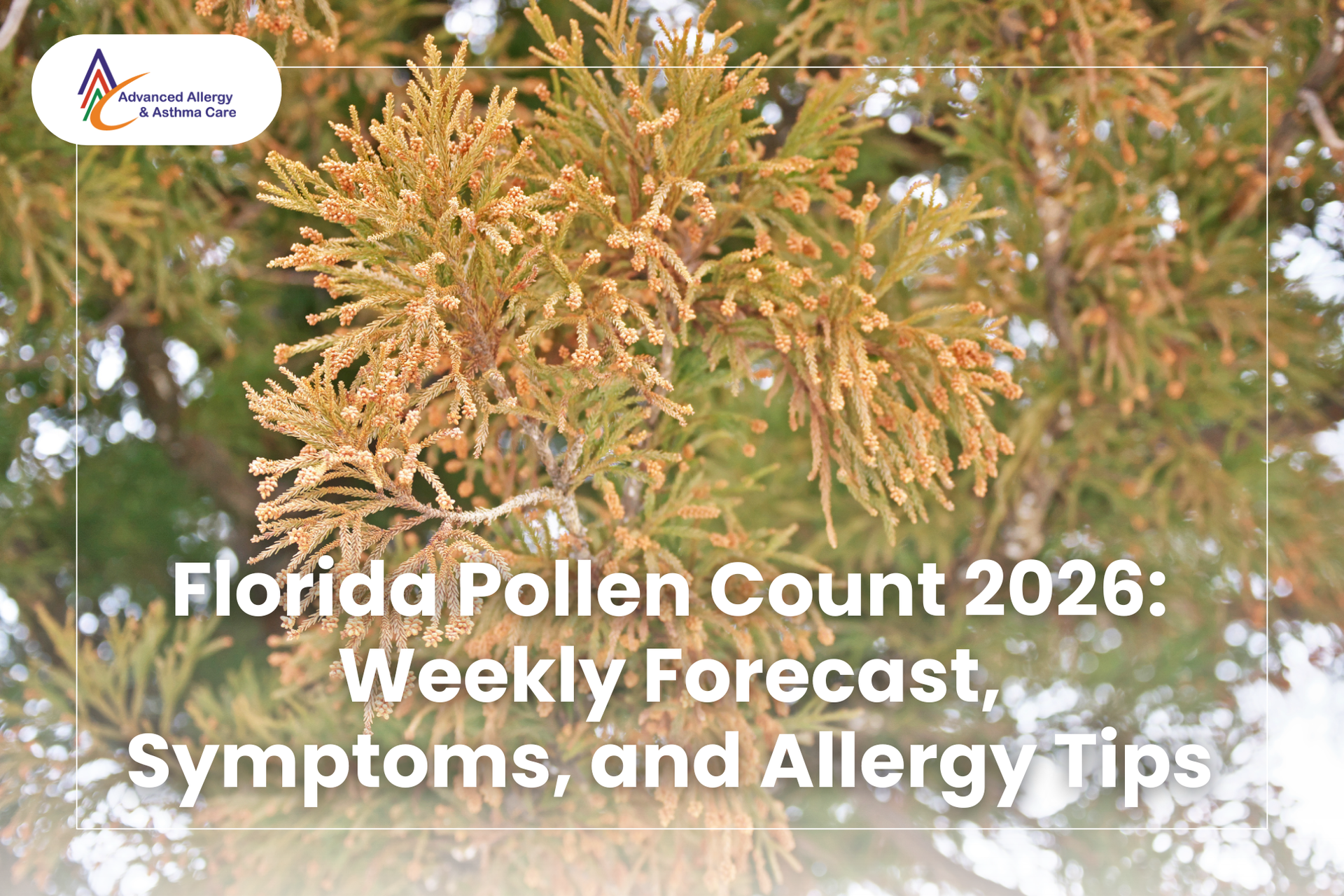At-home food allergy testing kits are popping up everywhere, promising quick answers to symptoms like bloating, fatigue, or skin rashes. It’s easy to see why people are tempted. After all, who wouldn’t want answers from the comfort of their own home?
But not all tests are created equal. Hence, they may not tell the full story of your relationship with certain foods.
Before you start cutting foods from your diet or relying on results, it’s important to know what these tests can (and can’t) do. Advanced Allergy and Asthma Care is here to help you sort fact from fiction with
trusted, science-based food allergy treatment that puts your health first.
Let’s Clear the Air (and Your Symptoms)
What Are At-Home Food Allergy Tests, Really?
These tests typically arrive in a neatly packaged kit where they ask you to prick your finger, place a few drops of blood on a card, and mail it off to a lab. A few weeks later, you’ll get a report that often comes with a long list of foods you’re “reactive” to.
Isn’t that enough?
Not necessarily because these kits usually only measure Immunoglobulin G (IgG) antibodies, which are part of your immune system. But IgG responses often just show that your body has been exposed to a food, not that you’re allergic to it.
This is completely different from true food allergies, which involve IgE antibodies. IgE triggers symptoms like hives, swelling, or even trouble breathing, and these usually require accurate
clinical food allergy testing to identify.
What about testing for food sensitivities and intolerances?
Some at-home tests claim to detect “food sensitivities” or “intolerances.” These terms aren’t always clearly defined and often confuse patients.
Neither is the same as a true allergy.
How Accurate are At-Home Food Allergy Tests?
Many think it’s great that such tests are conveniently available. But let’s talk about the not-so-great part: their accuracy and what that means for your health.
No FDA Oversight
Most at-home food allergy tests
aren’t regulated by the FDA. That means there’s no guarantee they’re clinically reliable or scientifically backed.
False Positives and False Negatives
These tests can flag foods as “problematic” even if you’re not allergic or miss real allergens altogether. That’s because they’re testing for IgG antibodies, which, according to the American Academy of Allergy Asthma & Immunology (AAAAI),
don’t prove to be an allergy.
Goodbye, Favorite Foods (for No Reason)
Because the results often look like a long list of reactive foods, many people end up cutting out dozens of items from their diet unnecessarily. If you’re not careful, that can lead to nutritional imbalances, confusion, and frustration.
Missing What Really Matters
If you rely only on these results, you might miss an actual allergy that requires attention. Self-diagnosing can delay getting the right care and potentially put your health at risk.
What Makes Clinical Allergy Testing Different (and Better)?
The huge difference between at-home tests and clinical testing (apart from the convenience) is that the latter gives you real, trustworthy answers—and here’s why:
Done by Experts
Our allergy testing is conducted by board-certified allergists who specialize in identifying and managing
professional food allergy diagnoses. It’s not merely taking a test; you’re getting care from professionals who know what to look for.
Proven Testing Methods
We use validated, science-backed tools, including:
- Skin prick testing: A quick, minimally invasive test that checks your skin’s reaction to small amounts of potential allergens.
- Specific IgE blood tests: This measures your levels of IgE antibodies, not just food exposure. Common lab tests would include:
ImmunoCAP or
ELISA (enzyme-linked immunosorbent assay).
- Oral food challenges: Conducted in a controlled setting with medical supervision, this is the most definitive way to confirm or rule out a food allergy.
It’s Not Just About the Numbers
We meticulously review your medical history, symptoms, and lifestyle so we can give you a full picture and not a report full of maybes.
We Know the Difference
Allergies, sensitivities, intolerances—they’re not all the same, and we can help you understand what’s really going on. We bring you the peace of mind you deserve with accurate diagnosis, safe care, and better peace of mind that at-home tests cannot provide.
Risks of Self-Diagnosing or Relying on At-Home Results
So, what’s the harm in doing a test at home “just to see”? Unfortunately, more than you might think.
Unnecessary Food Restrictions
When a test flags a dozen foods, it’s tempting to cut them all out “just in case.” But without a real diagnosis, that can lead to nutritional deficiencies, low energy, or an unbalanced diet.
Confusion and Stress
At-home results can be inconsistent, hard to interpret, or flat-out wrong, leading to more anxiety than answers. And let’s be honest: Googling your results usually doesn’t help.
Delaying Real Help
Every day spent second-guessing symptoms or following an unreliable test is a day you’re not getting proper care. This can lead to longer symptom flare-ups, mismanaged reactions, or the wrong treatment plan.
When To Get Tested for Food Allergies?
If you’re wondering whether it’s time to call in the experts, here’s a helpful checklist. But even if you haven’t had any of these, if you start to doubt yourself and the test, that’s already a good reason to reach out.
- You’ve had a reaction after eating.
- You have a history of allergies, eczema, or asthma.
- You’re concerned about your child’s symptoms.
- You’ve taken an at-home test and want real answers.
Know When to Skip the At-Home Test Completely
If you experience severe symptoms like:
- Trouble breathing
- Swelling of the face, lips, or throat
- Dizziness or fainting
- Anaphylaxis (a serious allergic reaction)
Stop relying on these kits immediately and seek medical help.
Trust the Process with Advanced Allergy and Asthma Care
When it comes to your health, the shortest path to feeling better starts with
accurate food allergy answers. At Advanced Allergy and Asthma Care, our dedicated team is ready to help and provide you with the expert care you deserve.
Expert Testing, Backed by Science
We offer a full range of clinically proven diagnostic tools—including skin prick tests, comprehensive IgE blood work, and oral food challenges—all interpreted and done by board-certified allergists.
Personalized, Ongoing Care
Each care we provide is unique. We take time to understand your history, symptoms, and lifestyle so your care is tailored specifically to you or your child.
Easy Scheduling & Support
We make it simple to book appointments and access care. We also provide patient education and guidance so you feel confident in every step and every bite you take.
Your relationship with food doesn’t have to be a lonely one. You deserve care that’s trustworthy, thorough, and focused on you. We’re here when you’re ready.
Stop Guessing and Start Feeling Better









